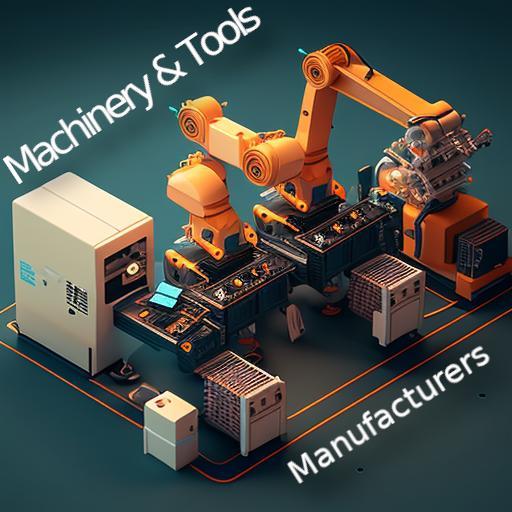


The machinery and tools manufacturing industry plays a pivotal role in shaping modern infrastructure and technological advancements. Whether you're a seasoned industry professional or an aspiring entrepreneur entering this dynamic sector, understanding the nuances of machinery and tool manufacturing is essential. This comprehensive guide aims to provide valuable insights and tips for navigating the intricate world of machinery and tools manufacturing, from optimizing production processes to staying ahead of technological trends.
In-Depth Market Research:
Before diving into machinery and tool manufacturing, conduct thorough market research. Understand current market trends, identify potential competitors, and assess the demand for specific types of machinery and tools. This knowledge will form the foundation for strategic decision-making.
Embrace Technological Advancements:
Stay abreast of the latest technological advancements in machinery manufacturing. Incorporate smart technologies, automation, and data analytics to enhance production efficiency, reduce costs, and improve overall product quality. Investing in innovation ensures your business remains competitive in the rapidly evolving landscape.
Quality Assurance is Paramount:
In machinery and tool manufacturing, the importance of quality assurance cannot be overstated. Implement stringent quality control measures throughout the production process to ensure that your products meet industry standards and exceed customer expectations. Consistently delivering high-quality machinery builds trust with clients and enhances your reputation in the market.
Robust Research and Development:
Establish a dedicated Research and Development (R&D) department to continually innovate and improve your products. Regularly invest in R&D to develop cutting-edge machinery and tools that address emerging needs in various industries. A commitment to innovation positions your manufacturing business as an industry leader.
Efficient Supply Chain Management:
Efficient supply chain management is crucial for timely production and delivery. Cultivate strong relationships with suppliers, optimize inventory management, and embrace lean manufacturing principles to minimize waste and streamline operations. A well-managed supply chain contributes to cost-effectiveness and agility.
Focus on Sustainability:
Incorporate sustainable practices into your manufacturing processes. From eco-friendly materials to energy-efficient production methods, sustainability is a growing concern for both consumers and businesses. Implementing environmentally conscious practices not only aligns with global initiatives but also enhances your brand reputation.
Employee Training and Safety:
Invest in comprehensive training programs for your workforce to ensure they are well-versed in the operation and maintenance of machinery. Prioritize workplace safety, providing the necessary equipment and training to prevent accidents and create a secure working environment.
Adaptability to Market Demands:
The manufacturing landscape is subject to market fluctuations and changing demands. Cultivate adaptability in your business strategy to respond effectively to shifts in market demands. This may involve diversifying your product range, exploring new markets, or modifying existing products to meet evolving customer needs.
Establish a Strong Online Presence:
In today's digital age, having a robust online presence is essential for reaching a global audience. Invest in a professional website, leverage social media platforms, and implement digital marketing strategies to showcase your machinery and tools, connect with potential clients, and stay visible in the industry.
Networking and Industry Collaboration:
Participate in industry events, trade shows, and networking opportunities to connect with other professionals, potential clients, and suppliers. Collaborate with industry partners to explore new business opportunities, share knowledge, and stay informed about industry trends and best practices.
Regulatory Compliance:
Stay updated on industry regulations and compliance standards. Adhering to legal requirements ensures the safety and reliability of your machinery and tools. Regularly review and update your processes to align with evolving regulatory frameworks.
Continuous Improvement Culture:
Foster a culture of continuous improvement within your organization. Encourage feedback from employees, embrace a mindset of learning, and regularly assess and refine your manufacturing processes. Continuous improvement drives efficiency and positions your business for sustained success.
Machinery and tools manufacturers can be divided into several categories based on the types of products they manufacture. Some of the main categories include:
Construction machinery: This category includes heavy machinery used in construction and infrastructure projects, such as excavators, bulldozers, loaders, and cranes.
Agricultural machinery: This category includes machinery used in agriculture, such as tractors, harvesters, cultivators, and sprayers.
Industrial machinery: This category includes machinery used in manufacturing and industrial settings, such as machine tools, presses, and robots.
Mining machinery: This category includes heavy machinery used in mining operations, such as drills, loaders, and conveyor systems.
Electrical tools and equipment: This category includes tools and equipment used for electrical work, such as power drills, saws, and wire strippers.
Hand tools: This category includes manual tools used for a variety of tasks, such as hammers, screwdrivers, wrenches, and pliers.
Power tools: This category includes motorized tools used for a variety of tasks, such as drills, saws, sanders, and grinders.
Cutting tools: This category includes tools used for cutting materials, such as saw blades, drill bits, and knives.
Measuring and testing tools: This category includes tools used for measuring and testing, such as tape measures, calipers, and multimeters.
Several countries are major producers of machinery and tools in the world. According to recent data, some of the top-producing countries include:
China: China is the largest producer of machinery and tools in the world. It produces a wide range of products, including construction machinery, agricultural machinery, and industrial machinery.
United States: The United States is a major producer of machinery and tools, particularly in the areas of industrial machinery and cutting tools.
Germany: Germany is known for its precision engineering and produces a wide range of machinery and tools, including industrial machinery, cutting tools, and machine tools.
Japan: Japan is a major producer of machinery and tools, particularly in the areas of industrial machinery and electrical tools and equipment.
South Korea: South Korea is a major producer of machinery and tools, particularly in the areas of electrical tools and equipment and hand tools.
Italy: Italy is known for its production of machine tools, particularly those used in the metalworking industry.
Taiwan: Taiwan is a major producer of machinery and tools, particularly in the areas of industrial machinery, electrical tools and equipment, and hand tools.
India: India is a major producer of machinery and tools, particularly in the areas of construction machinery, agricultural machinery, and industrial machinery.
France: France produces a wide range of machinery and tools, including machine tools, cutting tools, and industrial machinery.
United Kingdom: The United Kingdom is known for its production of machine tools, particularly those used in the aerospace and automotive industries.
Canada: Canada is a big producer of machinery and tools, particularly in the areas of mining machinery, industrial machinery, and hand tools.
Brazil: Brazil is a major producer of agricultural machinery, particularly in the areas of tractors and harvesters.
Russia: Russia is a significant producer of machinery and tools, particularly in the areas of heavy machinery and industrial machinery. The country has a long history of engineering and manufacturing, with a particular focus on heavy industries such as mining, oil and gas, and construction.
There are several kinds of innovations in the heavy machinery and tools sector that are currently being developed or implemented. Some examples include:
Automation and Robotics: Heavy machinery and tools are becoming increasingly automated and are being equipped with sensors, cameras, and other technology to improve efficiency and reduce the need for human intervention.
Internet of Things (IoT): IoT technology is being integrated into heavy machinery and tools to collect and analyze data on machine performance and maintenance needs. This data can then be used to optimize performance, reduce downtime, and extend the lifespan of the equipment.
3D Printing: 3D printing technology is being used to produce custom-made parts for heavy machinery and tools. This can reduce lead times and costs associated with traditional manufacturing processes.
Augmented Reality (AR): AR technology is being used to provide real-time information and training to operators of heavy machinery and tools. This can help improve safety, reduce errors, and improve productivity.
Hybrid and Electric Power: Heavy machinery and tools are being developed with hybrid and electric power systems to reduce emissions and improve fuel efficiency.
These innovations are aimed at improving the performance, safety, and sustainability of heavy machinery and tools, and are likely to continue to shape the industry in the years to come.
Navigating the world of machinery and tools manufacturing requires a strategic mindset, a commitment to quality, and a readiness to embrace technological advancements. By incorporating these tips into your business strategy, you can position your manufacturing venture for success, contributing to the advancement of industries and shaping the future of technology and infrastructure. Embrace the challenges, stay innovative, and let your machinery and tools be a testament to the craftsmanship and dedication of your manufacturing prowess.
All the best,

We use cookies
We use cookies and other tracking technologies to improve your browsing experience on our website, to show you personalized content and targeted ads, to analyze our website traffic, and to understand where our visitors are coming from. Privacy Policy.